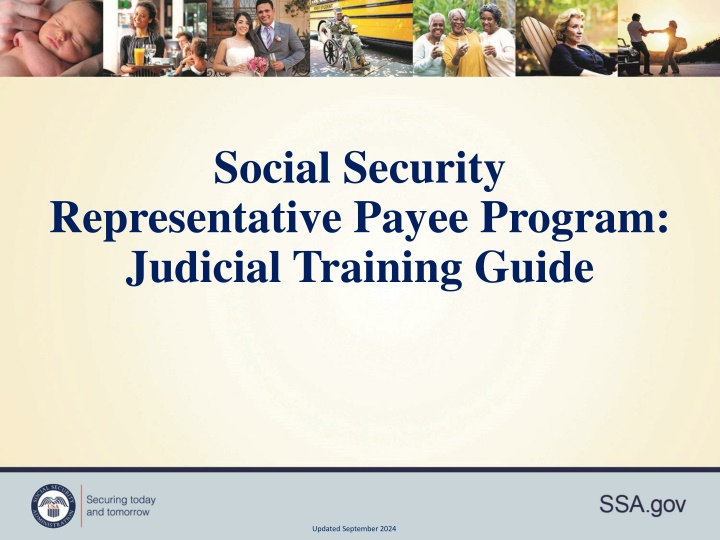
Social Security Representative Payee Program
Learn about the role of a representative payee, how they manage Social Security benefits, and the importance of protecting beneficiaries' financial well-being through this comprehensive training guide.
Download Presentation

Please find below an Image/Link to download the presentation.
The content on the website is provided AS IS for your information and personal use only. It may not be sold, licensed, or shared on other websites without obtaining consent from the author. If you encounter any issues during the download, it is possible that the publisher has removed the file from their server.
You are allowed to download the files provided on this website for personal or commercial use, subject to the condition that they are used lawfully. All files are the property of their respective owners.
The content on the website is provided AS IS for your information and personal use only. It may not be sold, licensed, or shared on other websites without obtaining consent from the author.
E N D
Presentation Transcript
Social Security Representative Payee Program: Judicial Training Guide Updated September 2024
Objectives of Training Guide Better serve people who have both a payee and a guardian. Enhance collaboration between the courts and Social Security. Orient judges and court staff to the Social Security Representative Payee program. Highlight similarities and differences between a representative payee and a guardian. Alert courts to possible misuse of Social Security payments.
Training Agenda Overview of Social Security programs. Comparison of guardian and representative payee systems. Representative payee duties. Guardianship fees from Social Security payments. Best practices for coordination.
Social Securitys Programs Retirement, Survivors, and Disability Insurance (Social Security) Supplemental Security Income (SSI)
Social Security Protects workers and their families from loss of earnings due to one of the following reasons: Retirement Disability Death
Supplemental Security Income (SSI) Adults and children might be eligible for SSI if they have: 1. Little or no income, and 2. Little or no resources, and 3. A disability, blindness, or are age 65 or older.
What is a Representative Payee? A representative payee is a person or an organization we appoint to receive and manage Social Security benefits or SSI payments for anyone who can t manage or direct the management of their benefits. A payee s main duties are to use the benefits to pay for the current and future needs of the beneficiary and properly save any payments not used to meet current needs. A payee must also keep records of expenses. When we requests a report, a payee must provide an accounting of how they spent or saved the payments. *Social Security has the sole authority to appoint a representative payee.
What is a beneficiary? A beneficiary is a recipient of Social Security benefits or Supplemental Security Income (SSI) payments. Social Security and SSI are two different programs. We administer both programs.
Initiation Guardian vs. Representative Payee Guardian Representative Payee Petition to court Application to Social Security Any interested person Proposed payee Beneficiary Third party referral
Need Guardian vs. Representative Payee Guardian Representative Payee Statutory definition of incapacity Incapacity to manage or direct the management of benefits Finding based on clear and convincing evidence Court finding of legal incompetency Most children under age 18 unless emancipated
Process Guardian vs. Representative Payee Guardian Representative Payee Notice Local Social Security office investigates and reviews: Medical statement; possible visitor or guardian ad litem investigation Legal (e.g., certified copy of a court order, guardianship, or conservatorship addressing legal competence) Possible appointment of counsel Medical (e.g., signed and dated statement from a medical source-physician, psychologist or other qualified medical practitioner addressing capability) Hearing, testimony, possible presence of person Court order Lay evidence (e.g., statements made by the beneficiary or a third-party source regarding beneficiary s capability) *Social Security has the sole authority to appoint a representative payee.
Selection Guardian vs. Representative Payee Representative Payee Guardian Prospective Payee Prospective Payee in petition Must file an application to be a payee with Social Security Statutory preference Family Regulation guidance Corporate Custodial Parent or Spouse Professional Legal guardian Public Relative Volunteer Friend Possible background check Public or nonprofit agency Investigation, including criminal background checks, occur during application and on-going background checks while serving as payee.
Authority Guardian vs. Representative Payee Representative Payee Guardian Only Social Security benefits Full or limited Property A payee has no legal authority to manage non-Social Security income or medical matters. A representative payee, however, may need to help a beneficiary get medical services or treatment. Person Both property and person A Guide for Representative Payees
Reporting Guardian vs. Representative Payee Representative Payee Guardian Annual Accounting Inventory Expenditures Accounting Conserved funds Possible guardianship plan Report changes that may affect the beneficiary s entitlement or amount of payment Status report Some exceptions to annual accounting apply Subject to payee site review monitoring (Please see slide 20 for complete list)
Last Resort Guardian vs. Representative Payee Guardian Representative Payee Public guardianship program in many states or localities A private institution operated for profit and licensed under state law, which has custody of the beneficiary Persons other than above who are able and willing to serve as a payee for a beneficiary; e.g., members of community groups or organizations who volunteer to serve as payee for a beneficiary *This list of last resort are for adult beneficiaries who do not have a drug addiction or alcoholism condition. *The list of last resort for individuals with a drug or alcohol condition are 20 C.F.R. 404.2021 and 20 C.F.R $$ 416.621
Financial Management Guardian vs. Representative Payee Guardian Representative Payee Fiduciary duty Fiduciary duty Possible bond; restricted accounts Maintain current needs Marshal assets Special bank account Separate bank account Guidance on creditors claims Possible statutory guidance on investment No contracts Possible court approval of real estate and asset sale Personal responsibility for misused funds Account to court
Participation Guardian vs. Representative Payee Representative Payee Guardian Notice of hearing Advance notice of need for a payee May attend hearing Opportunity to protest Appeal to higher state court Notice of payee appointment May file for termination & restoration of rights Appeal to Social Security
Who Needs a Representative Payee? Adults incapable of managing or directing the management of their Social Security benefits and SSI payments Adults declared by court as incompetent Most minor children under the age of 18
Representative Payee Duties Determine the beneficiary s needs and use their payments to meet those needs; Save any money left after meeting the beneficiary s current needs in an interest- bearing account or savings bonds for the beneficiary's future needs; Report any changes or events which could affect the beneficiary's eligibility for payments; Keep accurate written records and upon Social Security s request, provide records of all payments received, spent, and saved; Report to Social Security any changes that would affect performance or continuing as payee; Complete reports accounting for your use of payments, as required; Return to Social Security any payments to which the beneficiary is not entitled. Return to Social Security any payments saved when no longer acting as the representative payee for the beneficiary.
Representative Payee Reporting Requirements Payee must report changes if they can no longer serve or if the beneficiary: Moves. Starts or stops working. Experiences improvement in their medical condition. Marries. No longer needs a payee. Dies. Disclaimer: This list is not all inclusive.
Representative Payee Reporting Requirements Payee must report changes if the beneficiary: Starts receiving another government benefit or the benefit amount changes. Travels outside the United States for 30 days or more. Is imprisoned for a crime that carries a sentence of more than one month. Is committed to an institution by court order for a crime committed because of a mental impairment. Experiences a change in custody or is adopted. Is entitled as a stepchild, and the parents divorce.
Representative Payee Reporting Requirements A payee must tell us if they: Are no longer responsible for the beneficiary. Move. No longer wish to be payee. Are convicted of a felony. Are violating a condition of probation or parole imposed under federal or state law.
Representative Payee Accounting Separately identify Amount spent on beneficiary s basic needs and personal items. Amount saved, if any. Submit By Mail. Online - www.ssa.gov/payee/form/index.htm
Representative Payee Accounting Online Single representative payees who are 18 or older can complete a Representative Payee Report online by logging in to their personal my Social Security account. To learn the benefits of and process for completing the form online, visit our Frequently Asked Questions for Payee Accounting webpage. *Must be 18 years or older to be appointed a representative payee.
Representative Payee Accounting Form Visit www.ssa.gov/payee and choose the applicable icons to complete the online accounting form. (Pages 1-2)
Representative Payee Failure to Report If the payee does not respond or cooperate, we may: Change payee. Initiate direct payment to beneficiary. Local Social Security offices must: Evaluate current payee for continued suitability. Consider if the beneficiary can manage their own payments. Document any suspected misuse or fraud.
Representative Payee Misuse of Beneficiary Funds Representative Payees may not: Use the beneficiary s payments for anything other than the use and benefit of the beneficiary. Put the beneficiary's funds in the representative payee s or another person's account. Keep conserved funds after no longer serving as a representative payee. Charge beneficiary for payee services unless authorized by Social Security.
Reporting Potential Misuse by Representative Payees If you suspect a representative payee has misused Social Security payments, contact your local Social Security office or Social Security OIG Fraud Hotline: https://oig.ssa.gov/report/ Provide identifying information for the representative payee and the beneficiary including: Names. Social Security numbers. Dates of birth. Provide details of when, how, and where.
Fee-for-Service Representative Payees A Fee-for-Service (FFS) payee is an organization authorized by Social Security to receive payment for their payee services. To qualify as an FFS payee, the organization must: Be a state/local government agency or a bonded and licensed community-based non-profit social service organization. Regularly serve at least 5 beneficiaries. Generally, not be a creditor of the beneficiary. Request approval in writing. Receive notice of approval from Social Security before collecting fee.
Fee for Service Organizational Payee Fees FFS organizational payees can collect the lesser of 10% of monthly benefit amount or: $54 (2024) for beneficiaries without listed diagnosis code involving drug addiction or alcoholism (DAA). $100 (2024) for beneficiaries with a listed diagnosis code involving DAA.
Fee-for-Service Representative Payees An organizational representative payee cannot collect the fee for service that we otherwise authorized if the organizational representative payee is already being compensated by court/guardianship fees for representative payee services. A representative payee cannot collect fees if the amount of compensation from court/guardianship fees for representative payee services equals or exceeds the fee for service that we otherwise authorized.
Representative Payee Monitoring-Site Reviews In addition to annual accounting, representative payee performance is monitored by conducting site reviews. We award annual grants to Protection and Advocacy (P&A) agencies in each U.S. state and territory to conduct these reviews on our behalf. A site review includes: A face-to face interview with the payee and, in most cases, a visit to the payee's location. Interviews with a sample of beneficiaries. Review of beneficiary s living quarters. Examination of the financial records and supporting documentation for each sampled beneficiary.
Representative Payee Monitoring-Site Reviews The Social Security Act requires us to periodically conduct an onsite review of: Single payees serving 15 or more beneficiaries or recipients. Organizational payees serving 50 or more beneficiaries or recipients. Fee-for-Service (FFS) payees. State mental institutions participating in our on-site review program. We also conduct discretionary site reviews of payees, including: Organizational payees serving 49 or fewer beneficiaries or recipients. Single payees serving 14 or fewer beneficiaries or recipients. Reviews triggered by reports of potential problems with the representative payee.
When Social Security Payments Can be Used for Guardian Costs & Fees A beneficiary s funds may be used for customary guardianship costs (or proceedings) and court-appointed fees, if: Guardianship appears to be in the beneficiary s best interests. The beneficiary's personal needs are met. The beneficiary s funds would not be depleted by the guardianship costs.
When Social Security Benefit CANNOT be Used for Guardian Costs & Fees Guardianship costs and fees are included as part of the state s support obligation to the beneficiary Costs or fees relate to an unsuccessful guardianship petition Beneficiary s funds will be depleted by the guardianship costs to the point where personal needs are unmet
Promising Court Practices to Coordinate With Social Security Representative Payee System Court practices when a guardian is also a representative payee Identify cases where there is dual role. Identify cases in which the guardian seeks a fee from a bank account containing Social Security benefits payments. Notify us of any changes to status of a guardian who is also representative payee. Report suspected abuse or exploitation by a guardian who is also a representative payee to: Your local Social Security office. The Social Security Office of Inspector General. Your local adult protective services.
Promising Court Practices to Coordinate With Social Security Representative Payee System Court- Social Security systemic coordination practices: Judges and court staff meet regularly with designated Social Security representative payees to address coordination and training needs. Recruit and encourage attorney volunteers to serve pro bono as representative payees.
Advance Designation We offer the option to designate a representative payee in advance of needing one. Advance designation allows you to select up to three people who could serve as a representative payee for you if the need ever arises. Advance designation is available to capable adults and emancipated minors who are applying for or receiving Social Security benefits, SSI ,or Special Veterans Benefits. We only contact advance designees if we need to find a representative payee to serve you.
Representative Payee Portal The Representative Payee Portal is a central portal for representative payees with a personal mySocial Security account to conduct their own business or manage direct deposit, wage reporting, and annual reporting for their beneficiaries. To access the portal, sign in to or create a personal mySocial Security account. Select Representative Payee Services to be able to conduct the following: Complete annual accounting View current benefit details Update or enroll in direct deposit For more information about the Representative Payee portal, check out How to Use the Representative Payee Portal.
Social Security Collaboration with Working Interdisciplinary Network of Guardianship of Stakeholders (WINGS) 26 WINGS groups Social Security serves as a designated key stakeholder
Key Resources for Courts Social Security Regional Communications Directors https://www.ssa.gov/agency/rcds.html#! Social Security Guide for Representative Payees https://www.ssa.gov/pubs/EN-05-10076.pdf Social Security Guide for Organizational Payees https://www.ssa.gov/payee/NewGuide/toc.htm U.S. Consumer Financial Protection Bureau, Managing Someone Else s Money https://www.consumerfinance.gov/consumer-tools/managing-someone-elses-money/ Social Security Legislative Bulletin https://www.ssa.gov/legislation/legis_bulletin_042418.html
Social Security Administration, USA, logo with tagline: Securing today and tomorrow






















